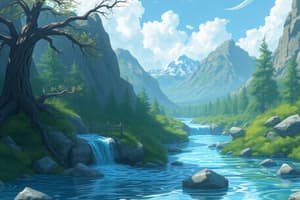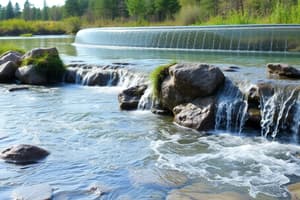Podcast
Questions and Answers
If the rate of evaporation from water bodies significantly decreases while transpiration rates from plants remain constant, what is the most likely short-term effect on atmospheric humidity?
If the rate of evaporation from water bodies significantly decreases while transpiration rates from plants remain constant, what is the most likely short-term effect on atmospheric humidity?
- Atmospheric humidity will increase due to the constant transpiration.
- Atmospheric humidity will stabilize as plants adjust to the changes in evaporation.
- There will be no change in atmospheric humidity as the processes are independent.
- Atmospheric humidity will decrease because total water vapor input lessens. (correct)
Considering a scenario where the Earth's temperature increases rapidly, which of the following changes in the water cycle processes would most likely lead to increased cloud formation and why?
Considering a scenario where the Earth's temperature increases rapidly, which of the following changes in the water cycle processes would most likely lead to increased cloud formation and why?
- Increased precipitation rates, leading to more atmospheric water content.
- Increased condensation due to warmer air holding more water vapor.
- Increased evaporation rates, leading to more atmospheric water vapour. (correct)
- Decreased evaporation rates, as cooler water inhibits water vapor formation.
In a region undergoing deforestation, what would be the most likely impact on the local water cycle?
In a region undergoing deforestation, what would be the most likely impact on the local water cycle?
- Increased groundwater recharge due to fewer roots absorbing water.
- Increased precipitation due to reduced interception.
- Reduced evapotranspiration, causing less moisture to return to the atmosphere. (correct)
- Decreased surface runoff due to increased soil absorption.
What is the most significant implication of saltwater intrusion into freshwater sources due to rising sea levels?
What is the most significant implication of saltwater intrusion into freshwater sources due to rising sea levels?
In the context of the water cycle, what is the critical role of vegetation, such as forests, in regulating water flow and availability?
In the context of the water cycle, what is the critical role of vegetation, such as forests, in regulating water flow and availability?
Which of the following scenarios would lead to a decrease in the amount of freshwater available in a region?
Which of the following scenarios would lead to a decrease in the amount of freshwater available in a region?
How does the process of condensation directly contribute to the formation of clouds?
How does the process of condensation directly contribute to the formation of clouds?
What is the most significant consequence of increased urbanization on the natural water cycle of a region?
What is the most significant consequence of increased urbanization on the natural water cycle of a region?
Which factor most significantly limits the evaporation rate in a humid environment?
Which factor most significantly limits the evaporation rate in a humid environment?
Why is the process of transpiration crucial for the continuation of the water cycle, especially in densely vegetated areas?
Why is the process of transpiration crucial for the continuation of the water cycle, especially in densely vegetated areas?
What is the primary reason rainwater is not salty, even though it originates from evaporated seawater?
What is the primary reason rainwater is not salty, even though it originates from evaporated seawater?
Predict the effect of extensive paving and building construction on groundwater recharge in suburban areas.
Predict the effect of extensive paving and building construction on groundwater recharge in suburban areas.
What long-term effect would the melting of glaciers and ice caps have on coastal freshwater supplies?
What long-term effect would the melting of glaciers and ice caps have on coastal freshwater supplies?
How would diverting a significant portion of a river's water for agricultural irrigation most likely affect the local water cycle?
How would diverting a significant portion of a river's water for agricultural irrigation most likely affect the local water cycle?
Given that groundwater is the primary source of freshwater in central and northern China, what could be a potential long-term environmental consequence of over-extraction?
Given that groundwater is the primary source of freshwater in central and northern China, what could be a potential long-term environmental consequence of over-extraction?
If Region 1 in China relies mostly on groundwater, what measure would be most effective to ensure sustainable water use in the long term?
If Region 1 in China relies mostly on groundwater, what measure would be most effective to ensure sustainable water use in the long term?
How does deforestation impact the flow of rainwater back to rivers or seas?
How does deforestation impact the flow of rainwater back to rivers or seas?
Which of the following outcomes could result from excessive extraction of groundwater?
Which of the following outcomes could result from excessive extraction of groundwater?
How would the expansion of impermeable surfaces (like roads and buildings) in urban areas MOST likely affect the local water cycle?
How would the expansion of impermeable surfaces (like roads and buildings) in urban areas MOST likely affect the local water cycle?
In an area experiencing increased rates of evaporation due to climate change, what compensatory mechanism in the local water cycle could potentially offset the increased water loss?
In an area experiencing increased rates of evaporation due to climate change, what compensatory mechanism in the local water cycle could potentially offset the increased water loss?
If a region experiences prolonged drought conditions, which consequence related to the water cycle is MOST likely to exacerbate the drought's impact?
If a region experiences prolonged drought conditions, which consequence related to the water cycle is MOST likely to exacerbate the drought's impact?
What is the most ecologically significant role of freshwater sources like rivers, lakes, and groundwater?
What is the most ecologically significant role of freshwater sources like rivers, lakes, and groundwater?
How might the construction of a large dam affect the water cycle in a river basin?
How might the construction of a large dam affect the water cycle in a river basin?
Which environmental change would MOST likely lead to a decrease in the amount of fresh water available from rivers & lakes?
Which environmental change would MOST likely lead to a decrease in the amount of fresh water available from rivers & lakes?
If a city switches from relying solely on surface water to also using groundwater, what is the mostly negative effect?
If a city switches from relying solely on surface water to also using groundwater, what is the mostly negative effect?
In what way can the alteration of land via urbanization typically most substantially affect the water cycle within region?
In what way can the alteration of land via urbanization typically most substantially affect the water cycle within region?
Which practice would best promote sustainable use of freshwater resources in an agricultural region?
Which practice would best promote sustainable use of freshwater resources in an agricultural region?
What is the MOST significant reason that glaciers are important for the global water supply?
What is the MOST significant reason that glaciers are important for the global water supply?
During which part of the day would a desert plant's rate of transpiration be at it's lowest?
During which part of the day would a desert plant's rate of transpiration be at it's lowest?
What is the most direct implication of extensive deforestation on regional patterns of precipitation?
What is the most direct implication of extensive deforestation on regional patterns of precipitation?
How does impermeable rock contribute for aquifer formation?
How does impermeable rock contribute for aquifer formation?
The continuous movement of water within the Earth and the atmosphere is best described as?
The continuous movement of water within the Earth and the atmosphere is best described as?
What role does salt play in the evaporation process?
What role does salt play in the evaporation process?
The continuous movement of water is best described as?
The continuous movement of water is best described as?
The release of vapor into the atmosphere is called?
The release of vapor into the atmosphere is called?
If most rainwater originates from evaporated seawater, why doesn't it contain salt?
If most rainwater originates from evaporated seawater, why doesn't it contain salt?
Flashcards
What is freshwater?
What is freshwater?
Water that is naturally occurring and not salty, suitable for consumption if clean.
What is the water cycle?
What is the water cycle?
The cyclical flow of water in different states between the atmosphere and the Earth's surface and underground.
What is Evaporation?
What is Evaporation?
The process where water in various bodies absorbs heat from the sun and turns into a gaseous state, rising into the atmosphere.
What is Transpiration?
What is Transpiration?
Signup and view all the flashcards
What is Evapotranspiration?
What is Evapotranspiration?
Signup and view all the flashcards
What is Condensation?
What is Condensation?
Signup and view all the flashcards
What is Precipitation?
What is Precipitation?
Signup and view all the flashcards
What is Infiltration?
What is Infiltration?
Signup and view all the flashcards
What is Percolation?
What is Percolation?
Signup and view all the flashcards
What is Surface runoff?
What is Surface runoff?
Signup and view all the flashcards
What is Throughflow?
What is Throughflow?
Signup and view all the flashcards
What is Groundwater flow?
What is Groundwater flow?
Signup and view all the flashcards
What is a Permeable rock layer?
What is a Permeable rock layer?
Signup and view all the flashcards
What is an impermeable rock?
What is an impermeable rock?
Signup and view all the flashcards
Study Notes
- Water Cycle is a constant process with rainwater flowing back to rivers or seas
Water Sources
- Include freshwater
- Rivers
- Lakes
- Groundwater
Freshwater
- It is naturally occurring and not salty
- It is suitable for consumption if cleaned or processed
- Freshwater comes from rivers, lakes, groundwater, glaciers, and rainwater
Earth's Water
- Oceans make up 96.5% of the total global water
- Freshwater accounts for just 2.5% of the total global water
- Of the freshwater, glaciers and ice caps make up 68.7%
- Groundwater makes up 30.1%
- Surface water and other freshwater constitute 1.2%
- The atmosphere hold 3.0% pf surface water
- Lakes account for 20.9%
- Ground ice and permafrost account for 69.0%
- Soil moisture accounts for 3.8%
- Swamps and marshes account for 2.6%
- Rivers account for 0.49%
- Living things account for 0.26%
Freshwater Sources in China
- China has many freshwater sources, including rivers, lakes, and groundwater
- There are 45,203 rivers in China
- The Yangtze River is the longest river in China and the third longest in the world
- Other major rivers include Yellow River, Pearl River, Songhua River, Huai River, Hai River, and Liao River
- The five largest freshwater lakes in China include Poyang Lake, Dongting Lake, Taihu Lake, Hongze Lake, and Chao Lake
- Lake Poyang is the largest freshwater lake in China
- Groundwater serves as the main source of water in central and north China
The Water Cycle
- It is also known as the hydrological cycle
- Refers to the flow of water (in different states) between the atmosphere and the lithosphere (ground surface and underground)
Importance of the Water Cycle
- It turns salty water in seas and oceans into fresh water for human use
- Feeds bodies of water on the ground surface as fresh water sources
- It maintains the lives of different plant and animal species, including humans
- It irrigates crops to provide food for humans and maintains daily life
Processes of the Water Cycle
- These include:
- Evaporation
- Transpiration
- Evapotranspiration
- Condensation
- Precipitation
Evaporation
- Water in different bodies of water on Earth absorbs heat energy from the sun
- This changes it into water vapour (gaseous state) and rises up to the atmosphere
- Salt does not evaporate because it is a heavy compound
Transpiration
- It is the release of water vapour by plants into the atmosphere after photosynthesis
Evapotranspiration
- Water in the lithosphere (crust and upper mantle of Earth) rises up to the atmosphere as water vapour
- This happens through evaporation and transpiration
Condensation
- Water vapour rises up to the atmosphere, cools, and condenses to form larger droplets (liquid state)
- Clouds form as these water droplets join together
Precipitation
- Water droplets in the atmosphere become larger and heavier
- Droplets fall and return to Earth's surface as different types of precipitation like snow, rain, sleet, or hail
Why Rainwater Isn't Salty
- Rainwater mostly comes from evaporated seawater, but isn't salty
- Salt doesn't evaporate because it is a heavy compound
- Since salt cannot evaporate, it is not carried by water vapour which rises into the atmosphere
- Water vapour condenses into fresh non-salty droplets
Ways Rainwater Returns to Rivers or Seas
- Infiltration occurs as water on the ground surface soaks vertically downward into the soil layer, forming soil storage
- Percolation occurs as soil water flows vertically downwards to the permeable rock layers (with a lot of pores) until it reaches the water table and forming ground water
- Groundwater store = aquifer formed above the impermeable rock layers
- Surface runoff occurs as water flows on the ground surface back to the rivers or seas
- Throughflow occurs as water soaks into the soil and flows horizontally across the soil layer back to the rivers
- Groundwater flow happens when groundwater remains deep in the rock layers and flows slowly and horizontally back to the rivers
- Once water flows into the river and then into the seas, the water cycle is complete, and then it starts again
Studying That Suits You
Use AI to generate personalized quizzes and flashcards to suit your learning preferences.




